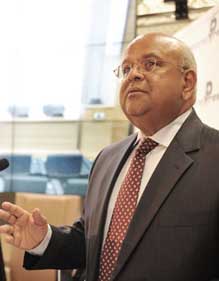|
Getting your Trinity Audio player ready...
|
 Valencia Talane
Valencia Talane
The one-size-fits-all approach to the governance standards of local government does not work and needs a rethink, according to Co-operative Governance and Traditional Affairs Minister Pravin Gordhan.
Gordhan, who was responding to the latest auditor-general report on municipalities on 30 July, said that the standard requirements for metro municipalities, for example, could not apply to smaller local municipalities for various reasons. The latter submit financial documents to be audited by the auditor-general, Kimi Makwetu, while the same documents have a broader purpose for larger municipalities like metros.
Download the full report here
"We need to sit down with the auditor-general and ask ourselves whether we should have the same level of rigour, the same transparency requirements and reporting requirements, but a different set of complexity," said Gordhan. "You don't want a municipality that has a population of 100 000 to have the same reporting requirements and the same disclosure requirements as Joburg municipality that has a population of four million and a very complex economic infrastructure and financial context."
The minister said that perhaps as early as 2015 he would be able to give feedback on progress made in implementing a multi-faceted method of good governance in the sector.
Gordhan, who previously headed the finance portfolio, said he was generally happy and welcomed the audit results as they showed movement in a positive direction. "Some of the hurdles that municipalities have to face are quite formidable, so there is some empathy for municipalities." He also called for better leadership in municipalities and for dedication from those tasked with making local government work.
Corruption Watch reported in June that Gordhan's shift to the Co-operative Governance and Traditional Affairs Ministry was seen largely as an effort to help improve the state of local government and rid it of its stigma of large-scale corruption and wasteful expenditure.
Makwetu welcomed Gordhan's support, saying that his office and the ministry now gave the same message – that of fixing local government from inside. "My office will continue to be part of such developmental initiatives by working closely with those charged with governance and oversight."
Consultants cash in
Close to R700-million was spent by municipalities on consultants during the year. Despite this amount, Makwetu's office had to return as much as 80% of initial financial statements as they were below the standard required. "We have to ask tough questions about why these consultants get paid and what are they actually doing in municipalities," said Gordhan, adding that the practice undermined rather than helped municipal financial performance.
A new approach would be discussed between his ministry and the National Treasury to centralise the procurement of consultants for municipalities. "This [will ensure] that vetting [will take] place and the right people with the right qualifications are hired." Recourse for non-performance could also be sought.
Makwetu said the cost of consultants was above that of the officials employed to carry out these duties. "It is evident that improvements in audit outcomes will be attained and sustained only if local government builds the institutional capacity required to maintain adequate internal controls, systems and processes," he said. Given the number of challenges facing local government, that money could be used better to achieve more.
Irregular expenditure
Irregular expenditure was reported at 265 of the municipalities and entities audited – or 83% of organisations. One reason for this was what Makwetu referred to as the "lack of basic controls and inadequate implementation of appropriate consequences where there has been poor performance or transgressions".
In total, irregular expenditure across local government came to R11.6-billion. Makwetu explained that for R8-billion of this, goods and services that were being procured were accounted for, however. The expenditure was deemed irregular because in many instances the proper supply chain procedures were not followed.
"I'm glad we got clarity from the auditor-general that irregular expenditure is not necessarily corrupt expenditure," said Gordhan. "It is very important for us to instil some confidence in the public that not all 300 000 people who work in municipalities are rogue."
In the mid-2000s, he added, the government introduced the generally recognised accounting practice (Grap) as the benchmark to which municipalities must adhere. "On reflection, we might not have given enough time and support for the implementation of Grap. The implications of the Grap standard are that you require a different set of competencies and processes and different types of record-keeping and disclosure in order to pass the test."
Not all municipalities were able to meet the requirements within the timeframe they were given. "We as South Africans have been excited about our new democracy, and suddenly we want everybody to meet the same standards."
The winning formula
Makwetu also explained his findings on what the municipalities that received clean audits seemed to be doing right.
"One of the things we have observed is that they have prioritised the appointment of people with technical competencies in their finance departments." The municipal leadership of these institutions, he added, ensured that the administration element was supported fully. When municipal managers and other managers in these institutions took decisions, they knew they had the full backing of the council and mayor.
"Another finding we have noted is that when there is an accountability model that has been set within an institution, the leadership is normally the first to act in accordance with it," said Makwetu. For such practices to continue, the monitoring of accountability models adopted had to be enhanced across the board.




